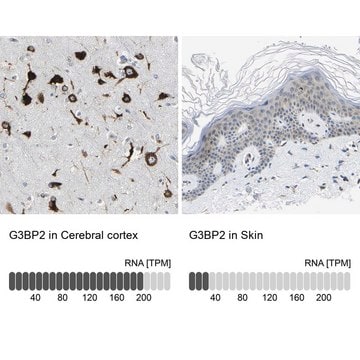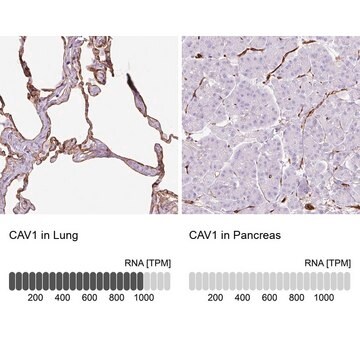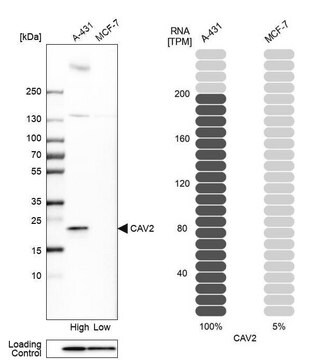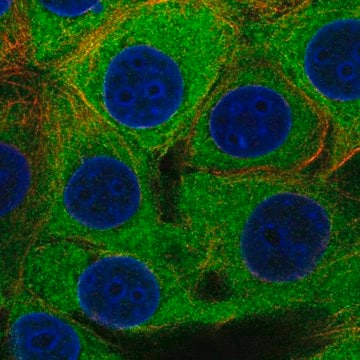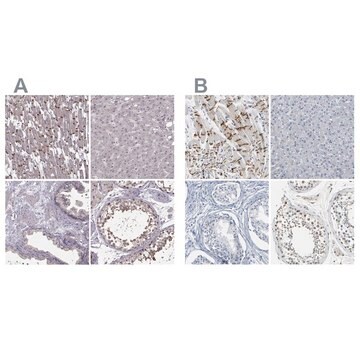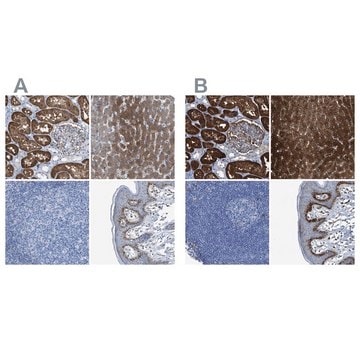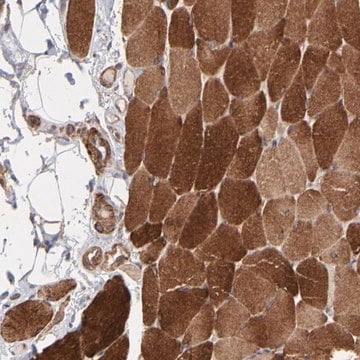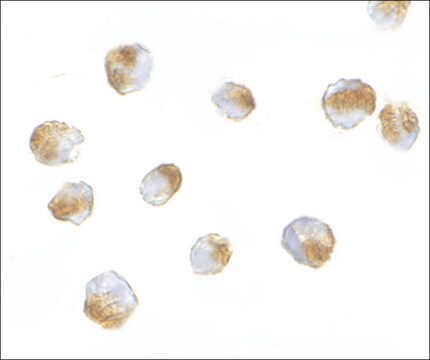推荐产品
生物源
rabbit
共軛
unconjugated
抗體表格
affinity isolated antibody
抗體產品種類
primary antibodies
無性繁殖
polyclonal
產品線
Prestige Antibodies® Powered by Atlas Antibodies
形狀
buffered aqueous glycerol solution
物種活性
human
加強驗證
recombinant expression
Learn more about Antibody Enhanced Validation
技術
immunoblotting: 0.04-0.4 μg/mL
immunohistochemistry: 1:50-1:200
免疫原序列
SILGTKRVLPGKYLEEIATQMRTHSINALLIIGGFEAYLGLLELSAAREKHEEFCVPMVMVPATVSNNVPGS
UniProt登錄號
運輸包裝
wet ice
儲存溫度
−20°C
目標翻譯後修改
unmodified
基因資訊
human ... PFKP(5214)
一般說明
The gene ATP-dependent 6-phosphofructokinase - platelet type (PFKP) has been mapped to human chromosome 10p15.3-p15.1. Phosphofructokinase is a tetromeric enzyme and is present in three isoforms: liver (PFKL), muscle (PFKM), and platelet (PFKP).
免疫原
phosphofructokinase, platelet recombinant protein epitope signature tag (PrEST)
應用
All Prestige Antibodies Powered by Atlas Antibodies are developed and validated by the Human Protein Atlas (HPA) project and as a result, are supported by the most extensive characterization in the industry.
The Human Protein Atlas project can be subdivided into three efforts: Human Tissue Atlas, Cancer Atlas, and Human Cell Atlas. The antibodies that have been generated in support of the Tissue and Cancer Atlas projects have been tested by immunohistochemistry against hundreds of normal and disease tissues and through the recent efforts of the Human Cell Atlas project, many have been characterized by immunofluorescence to map the human proteome not only at the tissue level but now at the subcellular level. These images and the collection of this vast data set can be viewed on the Human Protein Atlas (HPA) site by clicking on the Image Gallery link. We also provide Prestige Antibodies® protocols and other useful information.
The Human Protein Atlas project can be subdivided into three efforts: Human Tissue Atlas, Cancer Atlas, and Human Cell Atlas. The antibodies that have been generated in support of the Tissue and Cancer Atlas projects have been tested by immunohistochemistry against hundreds of normal and disease tissues and through the recent efforts of the Human Cell Atlas project, many have been characterized by immunofluorescence to map the human proteome not only at the tissue level but now at the subcellular level. These images and the collection of this vast data set can be viewed on the Human Protein Atlas (HPA) site by clicking on the Image Gallery link. We also provide Prestige Antibodies® protocols and other useful information.
生化/生理作用
ATP-dependent 6-phosphofructokinase - platelet type (PFKP) is a rate-limiting enzyme of glycolysis which catalyze the conversion of fructose-6-phosphate to fructose-1,6-bisphosphate. Autoanti-human protein S antibody interacts with PFKP and induces tissue factor expression and tissue factor-mediated procoagulant activity in human coronary artery endothelial cells. Tat-activating regulatory DNA-binding protein regulates glycolysis in hepatocellular carcinoma by controlling the expression of PFKP. Similarly, Kruppel-like factor-4 activates transcription of PFKP by binding to the PFKP promoter, thereby activating glycolytic metabolism in breast cancer cells.
特點和優勢
Prestige Antibodies® are highly characterized and extensively validated antibodies with the added benefit of all available characterization data for each target being accessible via the Human Protein Atlas portal linked just below the product name at the top of this page. The uniqueness and low cross-reactivity of the Prestige Antibodies® to other proteins are due to a thorough selection of antigen regions, affinity purification, and stringent selection. Prestige antigen controls are available for every corresponding Prestige Antibody and can be found in the linkage section.
Every Prestige Antibody is tested in the following ways:
Every Prestige Antibody is tested in the following ways:
- IHC tissue array of 44 normal human tissues and 20 of the most common cancer type tissues.
- Protein array of 364 human recombinant protein fragments.
聯結
Corresponding Antigen APREST74615
外觀
Solution in phosphate buffered saline, pH 7.2, containing 40% glycerol and 0.02% sodium azide.
法律資訊
Prestige Antibodies is a registered trademark of Merck KGaA, Darmstadt, Germany
免責聲明
Unless otherwise stated in our catalog or other company documentation accompanying the product(s), our products are intended for research use only and are not to be used for any other purpose, which includes but is not limited to, unauthorized commercial uses, in vitro diagnostic uses, ex vivo or in vivo therapeutic uses or any type of consumption or application to humans or animals.
未找到合适的产品?
试试我们的产品选型工具.
儲存類別代碼
10 - Combustible liquids
水污染物質分類(WGK)
WGK 1
閃點(°F)
Not applicable
閃點(°C)
Not applicable
Ian W Saunders et al.
European journal of human genetics : EJHG, 20(1), 91-96 (2011-08-11)
Up to 25% of colorectal cancer (CRC) may be caused by inherited genetic variants that have yet to be identified. Previous genome-wide linkage studies (GWLSs) have identified a new loci postulated to contain novel CRC risk genes amongst affected families
Changyi Chen et al.
Thrombosis research, 133(2), 222-228 (2013-12-18)
Autoantibodies including anti-human protein S antibody (anti-hPS Ab) and anti-human protein C antibody (anti-hPC Ab) can be detected in patients with autoimmune diseases with hypercoagulability. The objective of the present study was to determine the effects and molecular pathways of
Yun-Yong Park et al.
Hepatology (Baltimore, Md.), 58(1), 182-191 (2013-02-08)
Metabolic changes are common features of many cancer cells and are frequently associated with the clinical outcome of patients with various cancers, including hepatocellular carcinoma (HCC). Thus, aberrant metabolic pathways in cancer cells are attractive targets for cancer therapy. However
Jong-Seok Moon et al.
The Journal of biological chemistry, 286(27), 23808-23816 (2011-05-19)
Krüppel-like factor 4 (KLF4) is a transcription factor that plays an important role in cell differentiation, proliferation, and survival, especially in the context of cancers. This study revealed that KLF4 activates glycolytic metabolism in breast cancer cells by up-regulating the
Miji Jeon et al.
The Journal of biological chemistry, 298(3), 101675-101675 (2022-02-06)
A multienzyme metabolic assembly for human glucose metabolism, namely the glucosome, has been previously demonstrated to partition glucose flux between glycolysis and building block biosynthesis in an assembly size-dependent manner. Among three different sizes of glucosome assemblies, we have shown
我们的科学家团队拥有各种研究领域经验,包括生命科学、材料科学、化学合成、色谱、分析及许多其他领域.
联系技术服务部门

